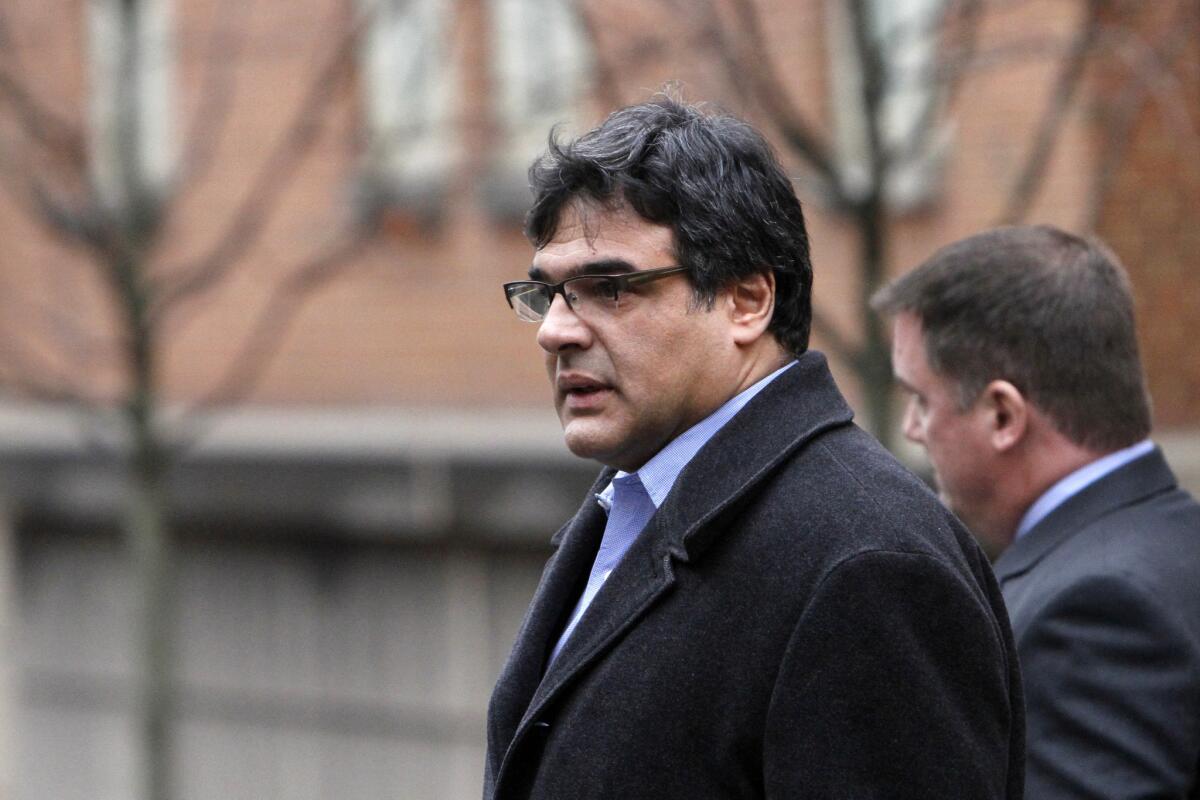Former CIA officer sentenced to 30 months in prison for info leak

- Share via
WASHINGTON – A former CIA officer was sentenced Friday to 30 months in federal prison for disclosing classified information to journalists in a case that underscored the Obama administration’s harsh crackdown on national security leaks.
John Kiriakou, a 14-year CIA veteran, pleaded guilty in October to identifying an undercover operative who was involved in the use of severe interrogation techniques, including waterboarding, on terrorism suspects during the George W. Bush administration.
While the Justice Department has said it won’t prosecute CIA officials who approved or conducted those interrogations, Kiriakou becomes the sixth current or former government official charged with revealing classified information since 2009.
Kiriakou’s lawyers and civil rights advocates portrayed the 48-year-old former counter-terrorism officer as a whistle blower who helped expose CIA torture of detainees then held in secret prisons. The CIA and its defenders denied using torture, which is illegal, referring instead to enhanced interrogation techniques.
U.S. District Court Judge Leonie M. Brinkema said Kiriakou had damaged the agency. She called the 2 1/2 year sentence, the result of a plea arrangement with prosecutors, “way too light.”
Kiriakou helped lead the CIA team that captured Abu Zubaydah, believed to a senior Al Qaeda facilitator, in Pakistan in 2002. Five years later, after he had left the agency, Kiriakou said in media interviews that Abu Zubaydah and other detainees were waterboarded while in CIA custody, offering among the first insider accounts of the agency’s use of simulated drowning.
Abu Zubaydah, who was waterboarded 83 times, divulged valuable intelligence on key Al Qaeda figures, including Khalid Sheikh Mohammed, mastermind of the Sept. 11, 2001, attacks. But he was also subjected to conventional questioning, making it difficult to determine if the harsher techniques were effective.
Kiriakou initially defended use of waterboarding and said it persuaded Abu Zubaydah to reveal important details. But his views “evolved,” he said, and eventually he decided the technique constituted torture.
Later, in emails with a freelance journalist, Kiriakou disclosed the name of a former CIA colleague who had taken part in the interrogations but who remained undercover. The freelance reporter then passed the name to a researcher who was working with lawyers representing terrorism suspects at the Guantanamo Bay detention facility.
When the CIA officer’s name appeared in the lawyers’ legal filings, federal prosecutors launched a leak investigation and traced its disclosure back to Kiriakou.
Kiriakou pleaded guilty to one count of violating the Intelligence Identities Protection Act, the first person convicted under that law in nearly three decades.
Critics of government secrecy lamented that the Obama administration was criminalizing conduct that was commonplace between journalists and government sources for decades.
“Is it is a very sad event in U.S. intelligence history, especially since they chose an individual who by all accounts, during his tenure at the agency, was a top flight officer,” said Matthew Aid, an intelligence historian and author of “Intel Wars: The Secret History of the Fight Against Terror.”
In court papers, Kiriakou’s lawyers noted that he earned the CIA’s Exceptional Service Award 10 times. They said he was duped into revealing the covert officer’s name by the freelance journalist, who didn’t reveal his ties to the Guantanamo Bay inmates’ lawyers.
The 30-month sentence matched that handed down to Vice President Dick Cheney’s former aide, I. Lewis “Scooter” Libby, after he disclosed the name of a covert CIA officer, Valerie Plame, to journalists. Libby was convicted of obstruction of justice and other charges in June 2007, but Bush commuted his prison sentence a month later.
Follow Politics Now on Twitter and Facebook
More to Read
Get the L.A. Times Politics newsletter
Deeply reported insights into legislation, politics and policy from Sacramento, Washington and beyond. In your inbox twice per week.
You may occasionally receive promotional content from the Los Angeles Times.











